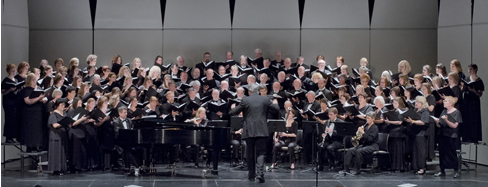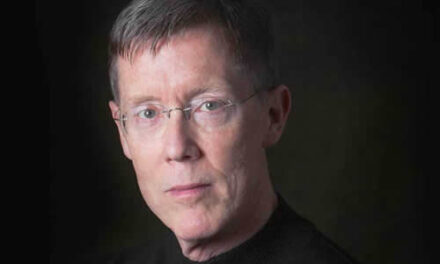This concert marked the sixth year that the Chamber Orchestra of the Triangle and the Concert Singers of Cary have come together to offer, with combined skill and will, gratifying results for the pleasure of Triangle concert-goers. On this occasion, Maestros Lorenzo Muti of the COT and Lawrence Speakman of the Concert Singers of Cary chose three outstanding choral works and invited the legendary Joseph Flummerfelt to be their guest conductor.
The program began with a work by America’s best known African-American composer, William Grant Still. Still was born in Woodville, Mississippi in 1896, the son of two teachers. His father died when he was an infant and his mother moved to Little Rock, Arkansas where she taught high school English for 33 years. She remarried and Still’s step-father nurtured his musical interests by taking him to concerts and buying him phonograph records. He attended college as a pre-med student but became involved in the university band, taught himself to play a number of instruments, and began to compose and arrange music for the band. He was awarded scholarships to Oberlin Conservatory of Music where he studied with Fredrick Lehmann, George Whitefield Chadwick and Edgard Varèse.
He was the first African-American to conduct major symphony orchestras and the first African-American to have a major work (his first symphony) performed by a leading symphony orchestra. He arranged and composed music for films and for popular bands and was awarded numerous recognitions throughout his career. He died in 1978 having created over 150 compositions, including chamber works, songs, symphonies and operas. As time goes on, it seems more and more of Still’s works are being discovered and appreciated for their fresh and unique approach.
From a Lost Continent is a collection of four songs for soloists and chorus with orchestra. “Song of Worship” is set in a dignified steady rhythm with a mystical touch, and was introduced by tenor Aaron Carlyle and then picked up by the choir. A hint of spiritual emerged as the song developed and ended quietly. “Song for Dancers” was sung by the chorus in a measured rhythm that had a primitive, not a ballroom, feel to it.
The third movement of the work, “Song of Yearning,” is constructed of an intricate weaving of soprano solo, haunting woodwinds and warm choral sounds supported by rich strings. The solo was performed exquisitely by soprano Megan Brachtl and, with the chorus and orchestra, it was a poignant statement of longing. The suite ended with “Song of Magic” which begins with some ominous sounding chords and a soprano with somewhat oriental sounding ornamentation, after which the chorus comments on the magic and then launches into a vigorously rhythmical chant. The chorus, orchestra, and soloists, all prepared and conducted by Speakman, performed beautifully.
Next Speakman conducted Ralph Vaughan Williams’ 1906 setting of Walt Whitman’s poem celebrating the journey of the soul – Toward the Unknown Region. Opening with a homophonic hymn-like introduction, most of this work is set in remarkable polyphonic choral writing. With wonderfully sustained lines and sensitive dynamics, the chorus and orchestra, led by Speakman, presented a thrilling rendition of this RVW masterpiece.
The second half of the concert featured a performance of Joseph Haydn’s masterful Missa in Angustiis, commonly referred to as the Lord Nelson Mass, and was conducted by the legendary Joseph Flummerfelt. Flummerffelt’s extensive career as choral conductor includes 33 years with the Westminster Choir and responsibility for most of the choral work of the New York Philharmonic. He was founder and director of the New York Choral Artists, and this is just scratching the surface of all he has done.
The thrilling Kyrie, with amazing vocal gymnastics provided by soprano Elizabeth Terry Joyner, was delivered with earnest vigor. The Sanctus is set in a fast-slow-fast structure, with the first portion started on its way with the soprano soloist; then, with occasional choral interjections, the bulk is given over to the quartet of soloists – alto Mary Gayle Green, tenor Wade Henderson and baritone John Kramar – all of them well known to Triangle audiences and with well-deserved reputations for musical and performance excellence. The “Qui tollis” is a dignified and reverent bass solo and the “Quoniam” returns to the opening vigor and, after developing into a dynamic fugue, ends with an especially powerful “Amen.”
After some impressive text-painting in the Credo, the warm and melodic Gloria carried us to another stirring Amen. An orchestral introduction led to the soprano solo in the Benedictus and this progressed with the addition of the other soloists and eventually led to a joyous “Osanna in Excelsis.” The gentle and exquisite Agnus Dei sung by the quartet of soloists was touching. With the “Dona nobis pacem,” another impressive fugue led to the final closing “Amen.”
The COT and the CSC seem to thrive in each other’s presence, and it is to be hoped that these conjoint concerts will continue for many years to come. It was a special treat to hear a piece by Still and a pleasure to hear the Vaughn Williams piece as well as a memorable experience to hear Haydn conducted by Flummerfelt.













